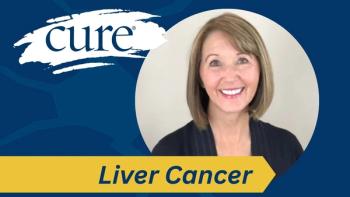
Genetic Profiling may Open Many Doors for Treating Cholangiocarcinoma
A gastrointestinal malignancy expert discusses the role genomics play in cholangiocarcinoma, as well as how genetic profiling may identify which treatment is best for patients.
With very few targeted therapies approved by the Food and Drug Administration (FDA) for the treatment of patients with cholangiocarcinoma — a rare cancer of the bile ducts — trials evaluating the use of infigratinib could potentially address an unmet need, according to Dr. Rachna T. Shroff.
“At the end of the day, I tell my patients, ‘this is not breast cancer, I don't have a multitude of FDA-approved drugs’,” said Shroff, chief of the section of gastrointestinal medical oncology and an associate professor of medicine at the University of Arizona Cancer Center in Tucson. “One of the unmet needs in these patients is just a lack of therapies.”
In an interview with CURE®, Shroff discussed the role genetic profiling plays in cholangiocarcinoma, the unmet needs in the treating the disease and what role the PROOF trial plays in addressing those unmet needs. The study aims to compare the safety and efficacy of infigratinib — an investigational FGFR inhibitor – in combination with standard-of-care chemotherapy in patients with FGFR2 fusion-positive cholangiocarcinoma. FGFR inhibitors block FGFR activity, which, in FGFR-driven cancers can slow proliferation and lead to cancer cell death.
CURE®: What role does genetic profiling play in cholangiocarcinoma?
Shroff: This is a great question because it is really interesting to see how my answer has evolved, but at this point in time, genomic profiling is absolutely a must in patients with cholangiocarcinoma and really should be part and parcel of their care right from the time of diagnosis. Molecular profiling has opened a vast array of therapies for these patients and I think we are doing them a disservice and shortchanging them if we are not doing our best to obtain molecular profiling on them right from the time that they are diagnosed.
How do genomics influence cholangiocarcinoma?
Genomics influences the disease in a lot of different ways. First, we think some of the genomic alterations that are found are prognostic and tell us a little bit about the biology of the disease, but most importantly it opens up therapies for patients, and in cholangiocarcinoma it's a solid 30% to 40% of patients who end up having targetable alterations for which we have drugs. And we currently have drugs that are now at least fast-tracked and approved by the FDA, and in addition to those drugs that have already gone through proof-of-principle trials, there are a myriad of clinical trials that could be available to patients. It is no longer the era of just gemcitabine and cisplatin and or FOLFOX, and it's really important that the potentially targetable alterations are identified early on so that we know if patients are eligible for clinical trials or other targeted therapies.
What are some of the unmet needs that need to be addressed in patients with cholangiocarcinoma?
The first unmet need is, frankly, that molecular profiling is not yet routine. As much as I think it is important for patients to get this done, we have learned that it is not yet integrated into standard practices uniformly across the country, or even across the world. So, I think that is an unmet need in terms of educating physicians as well as patients to recognize the importance of molecular profiling. The additional thing is this is a relatively rare cancer, and as a result, sometimes we have patients who are seen out in the community. For instance, patients sometimes are seen by physicians who are not, understandably, as familiar or comfortable with treating cholangiocarcinoma. Some of them don’t have access to the clinical trials that I think are really an important part of their treatment and thus patients don’t have access to the newest and latest drugs or therapeutic approaches.
What role does the PROOF trial play in addressing those unmet needs?
What's great about the PROOF trial, as well as all the other ongoing trials involving targeted therapies, is that for instance, with the PROOF trial we’re looking at an FGFR inhibitor that is intended for patients with FGFR2 fusion—positive cholangiocarcinoma. Now admittedly that’s about 10% to 15% of our patient population, it’s not a huge percentage, however, because the PROOF trial is a front-line trial, patients are getting molecular profiling as part of that trial. Even if they are not going to qualify for enrollment on PROOF, these patients are getting their entire molecular profiling done right at the time of their diagnosis.
How long does it typically take to get genetic profiling results back?
That is the million-dollar question. The profiling platforms, when they have the tissue in hand, have dramatically improved turnaround time and we able to get the sequencing information in a matter of a few weeks. The biggest hang-up has been getting the tissue in the hands of these companies, and/or the availability and volume of tissue. Very frequently we will find that we don’t have enough tissue.
For instance, extrahepatic cholangiocarcinoma is oftentimes diagnosed via cytology or brushings which are not core biopsies and there’s not a large amount of tumor tissue and so it is hard to get comprehensive molecular profiling on those patients. Similarly, even with intrahepatic cholangiocarcinoma there is oftentimes a lack of viable tissue and you don't have enough DNA to really get the full molecular profiling done. Additionally, once the biopsy is done, there’s a lag time for that biopsy to get into the hands of these companies, and even to the best of our abilities it still ends up being a good few weeks before we get this information.
What should patients be aware of regarding the wait time?
It’s the doctor’s job to make sure that the patients are clinically well enough and stable enough to wait. Those of us who treat this disease know the patients who can handle the lag time that comes with waiting for molecular profiling. Then there are some patients who clinically you just see them and know they need to start on a treatment sooner rather than later. As long as the clinical feeling is that a patient can wait, I have found it relatively easy to convince people to wait for the molecular profiling to come back because it enables them access to targeted therapies that they otherwise may not have. And for a lot of these front-line trials, it gives them the option of a non-chemotherapy treatment, if they get randomized to that arm. This really appeals to a lot of patients who want to avoid or delay being on IV chemotherapy like gemcitabine and cisplatin.
Why is it important for patients to consider participating in clinical trials led by expert clinicians, such as the PROOF trial?
I think it's important given that these targeted therapies have side effects and toxicities that are perhaps best managed by people who are familiar with these drugs and who know what the adverse events look like and how to approach them. I also think it’s important to be in the hands of somebody who has an understanding of when somebody is well enough to wait for molecular profiling and when somebody is truly responding or not responding to these targeted therapies in the setting of cholangiocarcinoma.

